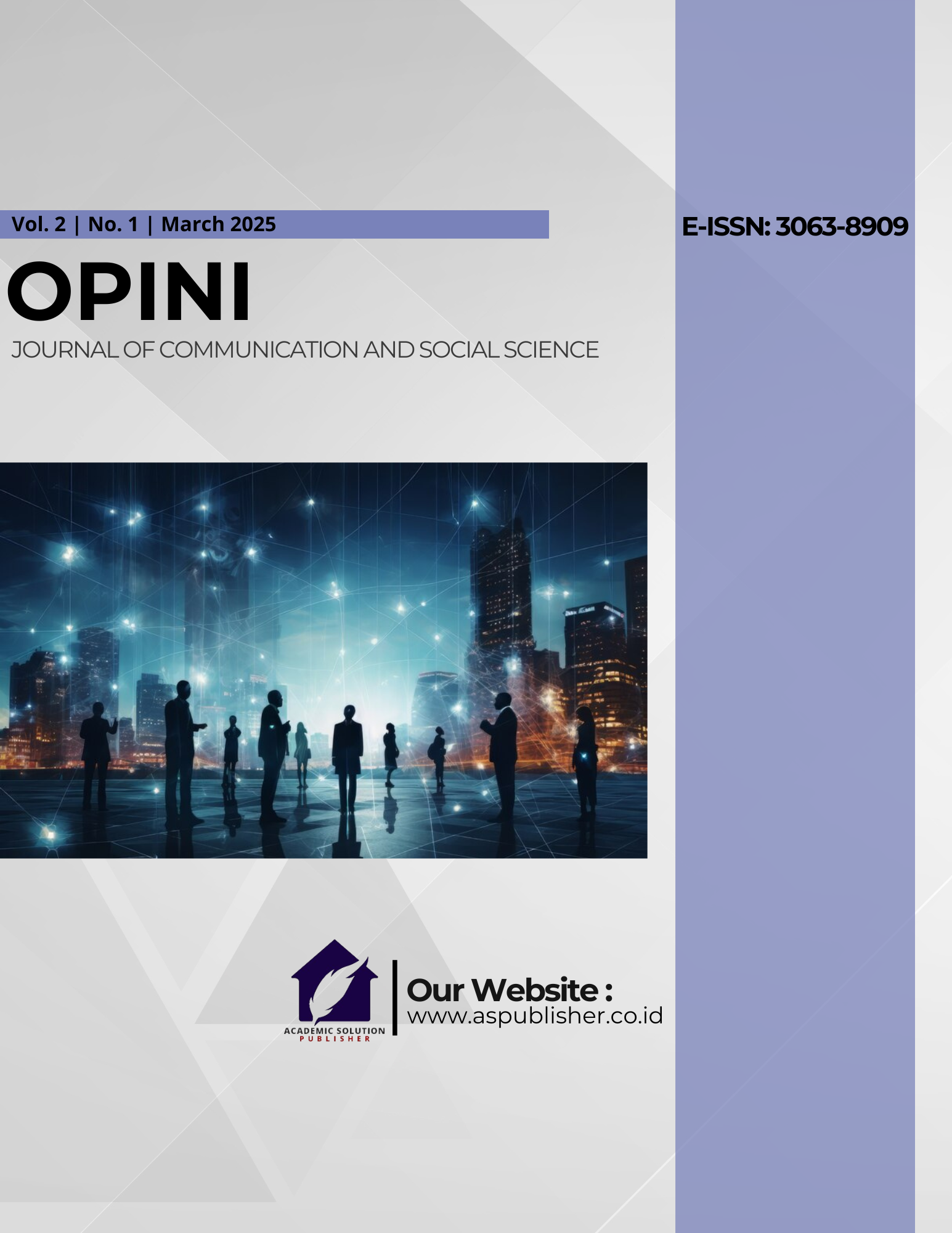POLITICAL COMMUNICATION OF AGRARIAN REFORM: REPRESENTATION OF THE STATE AND THE PEOPLE IN THE CURRENT OF GLOBAL NEOLIBERALISM
DOI:
https://doi.org/10.70489/arpzzy04Keywords:
Agrarian Reform, Political Communication, Land Inequality, NeoliberalismAbstract
This article analyzes how the state’s political communication constructs and legitimizes agrarian reform discourse within the framework of global neoliberalism. Using a Systematic Literature Review (SLR), the study synthesizes 32 peer-reviewed articles published between 2000 and 2025, selected based on thematic relevance, methodological rigor, and empirical contribution. The analysis identifies a consistent pattern of rhetorical commitment to agrarian justice paired with the material reproduction of land inequality. In particular, the administrations of Susilo Bambang Yudhoyono, Joko Widodo, and Prabowo Subianto have framed land reform as a technocratic process focused on land certification, while avoiding direct confrontation with entrenched elite land ownership. This communication strategy, rooted in hegemonic discourse, has normalized structural exclusion and depoliticized land conflicts. Despite the proliferation of populist slogans, policies remain aligned with corporate and investor interests, marginalizing rural communities and indigenous peoples. The study concludes that political communication in post-authoritarian Indonesia functions not merely as information dissemination but as an ideological tool to maintain elite consensus. Agrarian reform, to be effective, must be reclaimed as a political struggle rooted in participatory justice and grassroots mobilization. Without this shift, reform risks becoming an aesthetic performance rather than a transformative agenda.
References
Afiff, S., & Rachman, N. F. (2019). Institutional activism: Seeking customary land recognition in Indonesia. The Journal of Peasant Studies, 46(3), 528–549. https://doi.org/10.1080/03066150.2018.1476476
Auriga Nusantara. (2024). Laporan kehilangan hutan di dalam konsesi perusahaan. Jakarta: Auriga.
Borras, S. M., & Franco, J. C. (2010). From threat to opportunity? Problems with the idea of a “code of conduct” for land grabbing. Yale Human Rights and Development Law Journal, 13(2), 507–523.
Borras, S. M., & Franco, J. C. (2013). Global land grabbing and political reactions “from below”. Third World Quarterly, 34(9), 1723–1747.
CASP. (2024). Critical Appraisal Skills Programme Checklist. Retrieved from https://casp-uk.net/casp-tools-checklists/
Dalimunthe, M. A., Ritonga, A. R., & Ananda, S. (2025). The role of opinion leaders in bullying prevention: Evaluating the Roots Program in SMA Negeri 19 Medan through the lens of two-step flow communication theory. Komunika, 21(1), 33–40.
Dalimunthe, M. A., Ritonga, A. R., Dalimunthe, N. F., & Veronica, A. (2025). Effective communication in character education: A pathway to strengthening nationalism of SMP Swasta Islam Terpadu Jabal Noor student. Langgas: Jurnal Studi Pembangunan, 4(1), 13–22.
Edelman, M., & James, C. (2011). Peasants’ rights and the UN system: Quixotic struggle or emancipatory idea? The Journal of Peasant Studies, 38(1), 81–108. https://doi.org/10.1080/03066150.2010.538583
Escobar, A. (1995). Encountering development: The making and unmaking of the Third World. Princeton University Press.
Fairclough, N. (2013). Critical discourse analysis: The critical study of language. Routledge.
Ferguson, J. (1994). The anti-politics machine: "Development," depoliticization, and bureaucratic power in Lesotho. University of Minnesota Press.
Gough, D., Oliver, S., & Thomas, J. (2017). An introduction to systematic reviews (2nd ed.). Sage.
Gramsci, A. (1971). Selections from the prison notebooks. International Publishers.
Hadiz, V. R., & Robison, R. (2013). The political economy of oligarchy and the reorganization of power in Indonesia. Indonesia, 96, 35–57.
Harianto, F., Ohorella, N. R., & Dalimunthe, M. A. (2023). Kompetensi komunikasi guest service agent dalam mendorong kepuasan tamu MH Hotel Ipoh Malaysia. KomunikA, 19(2), 30–35.
Harvey, D. (2005). A brief history of neoliberalism. Oxford University Press.
JATAM. (2024). Data konflik dan konsesi pertambangan 2024. Jakarta: Jaringan Advokasi Tambang.
Li, T. M. (2007). The will to improve: Governmentality, development, and the practice of politics. Duke University Press.
Li, T. M. (2014). Land’s end: Capitalist relations on an indigenous frontier. Duke University Press.
Lucas, A., & Warren, C. (2013). The land, the law and the people. In Land for the people: The state and agrarian conflict in Indonesia. Ohio University Press.
Ohorella, N. R., Fauziah, D., & Dalimunthe, M. A. (2024). Brand awareness communication strategy in Setujuan Coffee marketing on Instagram social media. KomunikA, 20(2), 46–57.
Ong, A. (2006). Neoliberalism as exception: Mutations in citizenship and sovereignty. Duke University Press.
Padawangi, R. (2018). Water, place and equity in Jakarta's urban poor communities. Urban Studies, 55(9), 1986–2004. https://doi.org/10.1177/0042098017707733
Petticrew, M., & Roberts, H. (2006). Systematic reviews in the social sciences: A practical guide. Blackwell Publishing.
Purba, A. M., Dirbawanto, N. D., & Dalimunthe, M. A. (2025). Urban digitalization through clean energy: Policies and communication of Medan City government towards “Medan Smart City”. In IOP Conference Series: Earth and Environmental Science, 1445(1), 012067. IOP Publishing.
Rachman, N. F. (2011). The resurgence of land reform policy and agrarian movements in Indonesia. Journal of Agrarian Change, 11(4), 540–562. https://doi.org/10.1111/j.1471-0366.2011.00330.x
Rambe, R. F. A. L. K., Ritonga, A. R., & Dalimunthe, M. A. (2023). Komunikasi publik Pemerintah Kota Medan dalam pengalihan kewenangan kebijakan terkait UU No. 23 Tahun 2014. KomunikA, 19(1), 39–44. https://doi.org/10.32734/komunika.v19i01.11411
Snyder, H. (2019). Literature review as a research methodology: An overview and guidelines. Journal of Business Research, 104, 333–339. https://doi.org/10.1016/j.jbusres.2019.07.039
Thomas, J., & Harden, A. (2008). Methods for the thematic synthesis of qualitative research in systematic reviews. BMC Medical Research Methodology, 8(1), 45. https://doi.org/10.1186/1471-2288-8-45
Downloads
Published
Issue
Section
License

This work is licensed under a Creative Commons Attribution-ShareAlike 4.0 International License.








